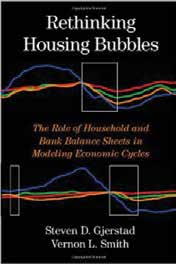
Rethinking Housing Bubbles
March 31, 2015
Nobel Laureate Vernon Smith and Presidential Fellow Steven Gjerstad examine the forces that led to the Great Recession
It’s safe to say that when two of the top economic scientists on the planet — Chapman University’s Nobel Laureate Vernon L. Smith and Chapman Presidential Fellow Steven D. Gjerstad — collaborate on a new book about balance sheet crises and housing bubbles, that work should be a must-read for anyone who wants to become better-educated about these fascinating issues that so recently contributed to the economic woes of the U.S. and other nations.
In the  just-released Rethinking Housing Bubbles: The Role of Household and Bank Balance Sheets in Modeling Economic Crises (Cambridge University Press, 2014), Smith and Gjerstad have set forth an accessible and comprehensive account of the recent U.S. housing bubble and subsequent crash, which will be instructive to general readers as well as economics experts and those involved in real estate and the markets.
just-released Rethinking Housing Bubbles: The Role of Household and Bank Balance Sheets in Modeling Economic Crises (Cambridge University Press, 2014), Smith and Gjerstad have set forth an accessible and comprehensive account of the recent U.S. housing bubble and subsequent crash, which will be instructive to general readers as well as economics experts and those involved in real estate and the markets.
Smith, who won the Nobel in 2002 for pioneering the field of experimental economics, and Gjerstad work and research together as members of Chapman’s Economic Science Institute (ESI), an academic center that uses the laboratory method of inquiry to study the role human institutions play in creating social rules and order, and also builds and tests market and management systems. Founded by Smith and fellow professors John Dickhaut, David Porter, Stephen Rassenti and Bart Wilson, ESI and its research span the fields of accounting, economics, finance, information systems, engineering, psychology, neuroscience, computer science, and philosophy.
The book has received glowing reviews from economists and other experts. James A. Dorn, senior fellow at the Cato Institute, said, “This book will force readers to re-think the causes of the Great Recession, to recognize the failure of widely used macroeconomic models, and to acknowledge the need for policy makers to get the rules right — because when ‘property rights fail, incentives fail, and markets fail.” In a review on Amazon, New Zealand bank official and monetary expert Roger Perry wrote, “There have been many books on the global recession of 2008. Some are insightful. This is one of them. It takes thinking on the business cycles and financial crises another step forward, and points to areas of future work. An excellent tour de force.”
In a recent series of three articles published in the Orange County Register, Gjerstad and Smith presented a classroom-style lesson on the economics of housing bubbles, government intervention, and patterns that appearedin previous downturns in the U.S. economy, summarized in large part from the new book.
The articles can be read in their entirety here.